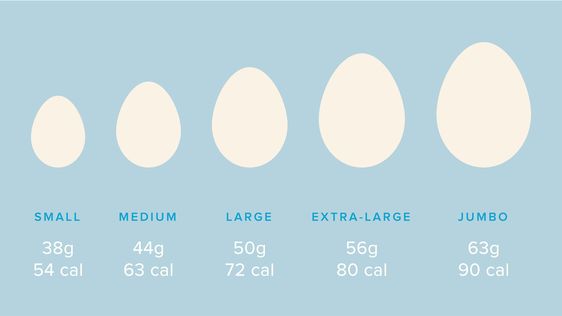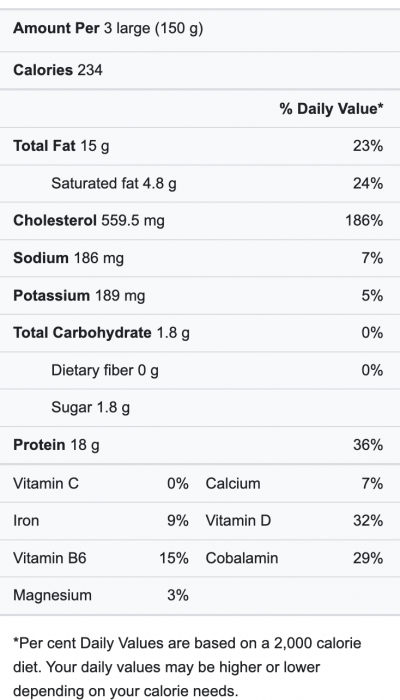How many calories in 3 eggs?
App

JustFit Meal Planner
Calories Charts
- Wine Calories
- Vegetable Calories
- Pizza Calories
- Fruits Calories
- Eggs Calories
- Chia Seeds Calories
- Hash Browns Calories
- Tequila Calories
- Streak Calories
- Miller Lite Calories
- Costco Croissant Calories
- Costco Chicken Bake Calories
- Chipotle Tortilla Calories
- Salmon Calories
- Miso Soup Calories
- Popeyes Biscuit Calories
How many calories in 3 eggs: There are roughly 234 calories in eggs about 122g according to the USDA.
Calories in eggs

How many calories in 4 eggs?
Four large eggs provide an excellent source of protein and healthy fats, but they also contain a significant amount of calories. If you consume four large eggs in one sitting, you can expect to consume between 250-360 calories depending on how they are prepared. If you’re watching your calorie intake, it’s important to consider the cooking method as well. Boiled or poached eggs are a healthier option than fried eggs. Overall, eggs can be a nutritious addition to your diet, but it’s important to consume them in moderation, especially if you’re trying to lose weight.
How much egg is 100 calories?
One large egg (50 grams) contains approximately 70-80 calories according to the USDA. So to get 100 calories from eggs, you would need to consume a little more than half of a large egg (around 36-40 grams). However, keep in mind that eggs are a rich source of protein, vitamins, and minerals. So consuming only a small portion of an egg may not provide all the nutritional benefits that come with eating a full egg.
How many calories in 3 eggs white?
Three large egg whites contain approximately 51-54 calories, depending on the size of the egg. Egg whites are a great source of protein and are low in calories. Making them a popular choice for people who are trying to watch their calorie intake or trying to lose weight. However, it’s important to note that the yolk of the egg contains most of the egg’s nutrients, including vitamins, minerals, and healthy fats. So while egg whites are a nutritious choice, you may want to consider incorporating whole eggs into your diet.
How many calories in 1 cup eggs?
One cup of scrambled eggs, which is typically made from 4-5 large eggs. Contains approximately 220-260 calories, depending on how they are prepared. Keep in mind that the calorie count may be higher. If you add ingredients such as cheese, butter, or oil to the eggs during cooking. If you’re trying to watch your calorie intake. Cooking eggs with non-stick spray or using a small amount of oil can help reduce calorie consumption.
Calories of different combinations of eggs
Eggs are a versatile food that can be prepared in a variety of ways. And the number of calories in each dish can vary depending on the cooking method and additional ingredients. For example, a simple hard-boiled egg contains around 70-80 calories. While a 3-egg omelette with cheese may have around 450-500 calories. A serving of scrambled eggs made with low-fat milk and veggies may contain around 200-250 calories. While a fried egg cooked in butter or oil can have over 100 calories per egg. If you’re watching your calorie intake. It’s important to be mindful of the cooking method and additional ingredients used in your egg dishes.
How many calories in 3 eggs and 3 pieces of bacon?
Three large eggs and three slices of bacon contain approximately 420-450 calories, depending on how the eggs and bacon are prepared. Keep in mind that the calorie count may be higher. If the bacon is cooked in oil or if additional ingredients such as cheese are added to the eggs. While eggs and bacon are a popular breakfast combination. They are high in saturated fat and should be consumed in moderation as part of a balanced diet. If you’re watching your calorie intake or trying to lose weight. Consider healthier options such as scrambled eggs with vegetables and lean protein instead.
How many calories in 3 eggs and 2 toast?
Three large eggs and two slices of toast contain approximately 400-450 calories. Depending on how the eggs and toast are prepared. Keep in mind that the calorie count may be higher. If additional ingredients such as butter, jam or cheese are added to the toast. Eggs and toast are a classic breakfast combination that provide protein and carbohydrates to fuel your day. However, if you’re trying to watch your calorie intake. It’s important to be mindful of portion sizes and to choose whole grain bread for added fiber and nutrients.
How many calories in 3 eggs with cheese?
Three large eggs with one ounce (28 grams) of cheese contain approximately 360-400 calories. Depending on how the eggs and cheese are prepared. Keep in mind that the calorie count may be higher. If additional ingredients such as butter, oil or vegetables are added to the eggs. While eggs and cheese are a tasty and nutritious combination that can provide protein and healthy fats. They are also high in calories and saturated fat. If you’re watching your calorie intake or have high cholesterol. Consider reducing the amount of cheese or choosing a low-fat cheese alternative.
How many calories in 3 eggs omelette?
A 3-egg omelet made with no added ingredients contains approximately 220-250 calories. However, the calorie count may be higher if additional ingredients such as cheese, vegetables, or meats are used to make the omelet. Adding cheese, for example, can add up to around 100 calories per ounce (28 grams). If you’re trying to watch your calorie intake, consider making a plain egg-white omelet or adding non-starchy vegetables such as spinach or mushrooms for extra nutrition without adding too many calories.
Nutritional components of eggs
Eggs are a highly nutritious food that contains a variety of essential vitamins and minerals. They are an excellent source of high-quality protein. As well as vitamin B12, vitamin D, and choline. They also contain significant amounts of selenium, riboflavin (vitamin B2), and phosphorus. While the yolk of the egg is a rich source of many of these nutrients. It also contains cholesterol and saturated fat. Egg whites, on the other hand, are high in protein but are lower in calories and fat. Overall, eggs can be a healthy addition to your diet. When consumed in moderation as part of a balanced meal plan.

How much sugar is in 3 eggs?
Eggs do not contain any significant amount of sugar. Eggs are considered a sugar-free food. A large egg contains less than one gram of carbohydrates, which is mainly from the egg white. Therefore, you can safely assume that there is no sugar in 3 eggs. However, keep in mind that if you add sugar or other sweeteners to your egg dishes, the sugar content will increase accordingly.
How much carbs is in 3 eggs?
Three large eggs contain approximately 1-2 grams of carbohydrates, depending on their size. The majority of the carbohydrates in eggs come from the egg white, which contains trace amounts of carbohydrates in the form of glucose, fructose, and other simple sugars. However, the amount of carbs in eggs is very low, making them a great option for those following a low-carb or ketogenic diet. Eggs are a good source of high-quality protein, healthy fats, and essential vitamins and minerals, without significantly contributing to your carbohydrate intake.
How much protein is in 3 eggs?
Three large eggs provide approximately 18-21 grams of protein, depending on their size. Eggs are considered a complete protein because they contain all nine essential amino acids that our body needs to function properly. The protein in eggs is easily digested and absorbed by the body, making them an excellent source of protein for building and repairing muscles, as well as supporting many other bodily functions. Therefore, consuming three eggs in a meal provides an adequate amount of protein to help you meet your daily protein requirement.
FAQs
Yes, it is generally safe for most healthy individuals to consume up to three whole eggs per day as part of a balanced diet. Eggs are a nutritious and high-quality source of protein, vitamins, and minerals, and consuming them as part of a healthy diet can provide many benefits. However, it’s important to be mindful of your overall calorie and fat intake, especially if you’re trying to lose weight or have high cholesterol levels.
Yes, boiled eggs are generally considered a healthier option than fried eggs. When eggs are fried, they are often cooked in oil or butter, which adds extra calories and fat to the dish. Additionally, high-heat cooking methods like frying can cause the cholesterol in the egg yolk to oxidize, which may contribute to inflammation in the body. Boiled eggs, on the other hand, are cooked in water and do not require added oils or fats, making them a low-calorie and low-fat option.
The amount of protein and calories needed for muscle gain varies depending on an individual’s age, sex, weight, and overall health status. However, generally, consuming 1-1.5 grams of protein per pound of body weight per day is recommended for muscle gain. For example, if you weigh 150 pounds, consuming 150-225 grams of protein per day may be beneficial for muscle growth. However, it’s also important to include other protein-rich foods like lean meats, beans, and dairy products in your diet to ensure you’re meeting your protein needs.
